Inspired by Slarek's recent blog and his sixteen choices of films of which to write a capsule review, I thought I'd offer similar capsule reviews of my recent slate of screen entertainment. I find it refreshing and true to form that there's not one film that made it to both of our lists. There are at least three on mine that I would love to have taken my time to cover in full but life zips by so fast these days and there are some demands on my time right now that I can neither ignore nor desert. With one exception, I have mostly positive things to say about each of this ridiculously eclectic list of my last month's viewing. I urge you to seek them out whether in socially-distance-practising cinemas or streaming services at home. As we are right in the middle of Awards Season, I'm aware that a few of these titles will get Oscar and BAFTA nods and my position in a certain organisation makes it possible for me to watch screeners of films that may only be released in the cinemas at the time of writing. If these films are not available to you right now, I hope these capsule reviews might make you seek them out further down the line. So, in alphabetical order, let's dive in…
BELFAST
Actor/director (and absurd moustache-owner in his Poirot role) Kenneth Branagh wrote an autobiography at the age of 30 entitled Beginning. An autobiography at 30? It was, it seems from the foreword, a money making attempt to get his theatre company Renaissance some funding to move it out of his flat and into 'sanity'. Fair enough. His account and subsequent late-career film of his early years in Northern Ireland is now a bona fide awards magnet. As we start in full colour flying over the modern city that is today's Belfast, we tilt up from a coloured mural to a descending wipe back in time to 1969 and starkly associated black and white. I share with Branagh the experience of that era, a past affected by almost everything in UK culture with the obvious exception of 'the Troubles' particular to Belfast at the time. Branagh was born four months before I was so we share so much culturally which gave me such a thrill to join his and my dots of childhood memories. For those too young or unaware, I have to define 'the Troubles'. Simplistically, most people in the UK may have the opinion that the conflict was a simple religious one, Catholics versus Protestants. But politics wound itself around the 'unrest' and vastly complicated the situation but at the heart of it was defining Northern Ireland as either part of the UK or politically linked with its southern neighbour. Essentially sectarian hatred led to escalating violence. As a child, whatever situations you grow up with must be seen as 'normal'. With what other experience can you judge your own experience? The film charts the struggles of a family in this dangerous environment and in particular asking the question "What are you capable of giving up to gift your family with a more peaceful life?" As you might expect, the acting is top notch with Caitríona Balfe as 'Ma' a stand out for me. I went through the film ticking off shared experiences (horror as Chitty Chitty Bang Bang drove off the cliff, me dressed up as a Thunderbird pilot, and shock at seeing my first stop motion dinosaurs). It's a lovely conceit that when you see the movies the family are watching in their black and white world, they are in blazing colour.
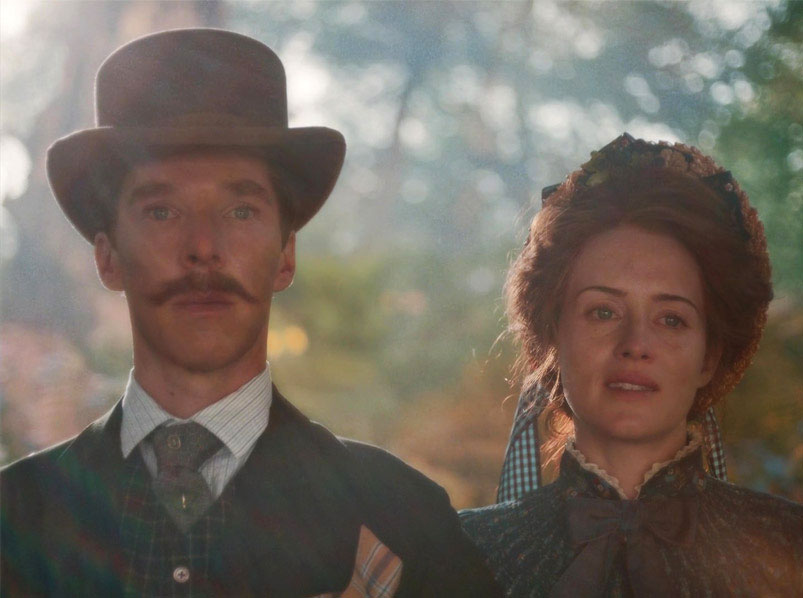
THE ELECTRICAL LIFE OF LOUIS WAIN
A synopsis of this charming oddity may give the impression that a grim time awaits you. But that would negate the warmth and earnest entertainment the film provides. In doing a little research, it's now clear to me that the Victorian public's response to the protagonist's many renditions of cats (his claim to fame) is due in part to the fact that very few people kept cats as pets in the 19th century and after Wain's work, the humble feline became the ubiquitous head of household that we know today. A friend starts to doubt Wain's hold on sanity after hearing he has taken a cat as a pet, and not a working mouse hunter… Illustrator Louis Wain is the sole breadwinner for his family of five sisters and a mother. The film charts his entire life story with, as you would expect, tragedies and triumphs along the way. The busiest actor of his generation, Benedict Cumberbatch is a perfect fit for the eccentric Wain and as his wife Emily, Claire Foy is wide eyed and endearingly convincing. The film is a quiet delight, understated and rich with exquisite period detail contained within a full 1.33:1 frame. The ageing make up is realistic without being showy and as our hero descends further into mental turmoil caused by the weight of grief in his life, the film provides an emotionally satisfying conclusion. Oh, and what's not to love in a film with the following line, "I once spent an entire dream stuck in a very complicated barn."
THE ETERNALS
From the sublime… The teaser or trailer for this film confounded me. Lined up on a beach, our heroes stood in the dullest overcast light duly (and dully) replicated on the poster. And dressed in their colourful costumes, this decision seemed perverse. Directed by Chloé Zhao, whose award winning Nomadland is as far from the Marvel Cinematic Universe as it is possible to be, the film looks and feels like a Marvel film. Zhao is clearly a fan and all power to producer Kevin Fiege who allows his Marvel babies to be directed by some left field choices. Obviously directors with little experience of bloated computer generated franchise productions can rely on a great deal of help. What Zhao brings to the table is her sensitivity for the character moments which exist however quietly between the motion blurs and over-styled coiffures. The film highlights a group of superpowered alien beings policing the Earth and protecting humankind through history from the Deviants, dragon-like monsters, all of whom were supposedly vanquished in the 16th century. It's refreshing to see Gemma Chan essentially headline the film. Despite her Chinese DNA, her Wiki bio reveals her to be as English as anyone can be. Still, Marvel are doing their bit for diversity. Every child wants to see someone who looks like them being a superhero. But eventually this film, like all others dealing with potentially world shattering events in the MCU (here this event is literal), has to scramble to excuse the non-participation of the other established superheroes in the scenes set in the present day. Part of me wants to see a Marvel movie where the stakes are quietly intimate and emotional, one Martin Scorsese might want to see… Can't quite see that happening as much as I'd like to.
GHOSTBUSTERS AFTERLIFE
After the commercially under-performing female remake of the original (which I have to say I enjoyed at the time while also understanding where all the gripes – if not the out and out hatred – came from) along comes Afterlife positively brimming with fan service that in some instances stops the narrative dead. Death is the key here to the whole film's existence. Harold Ramis, the actor who played Egon in the original, died in 2014. Egon's activities and guidance as a ghost himself in Afterlife have a certain poignancy given the loss of one of the iconic four actors of the original. This is a rural, pared down Ghostbusters tale which plays out at a steady pace and I do not mean that as a criticism. I liked the family very much and Carrie Coon playing Egon's daughter secures her place in my mind as the American Sally Hawkins; grounded, authentic and extremely believable. I first became aware of her in the intriguing series The Leftovers. She also has a great turn in dry humour. It's up to the family and friends well met to finish Egon's work in trapping the malevolent Gozer, this time returning in the lookalike guise of Dr. House's '15' or the ex-wife of Ted Lasso's Jason Sudeikis, Olivia Wilde. The surprise of the film is in its pared back nature. It doesn't try to outdo previous Ghostbusters entries but gently complements them. It's guilty of replaying scenes and even aping the original's specific shots but the film is breaking in a new generation so I guess this is to be expected. Yes, the ghosts are all here and there's a fun rounding up a metal-munching Slimer in a backwater Main Street sequence but at the conclusion people appear as you sort of always suspected they would and there's no surprise as to the identity of the ghost helping Egon's granddaughter to figure out what's required to defeat Gozer. The CG recreation of one of the original Ghostbusters is extraordinarily lifelike. We're getting there… And – albeit after her end credit, hullo Sigourney Weaver! A diverting film, with a few jump scares that's easy on the eye, ear and mind.
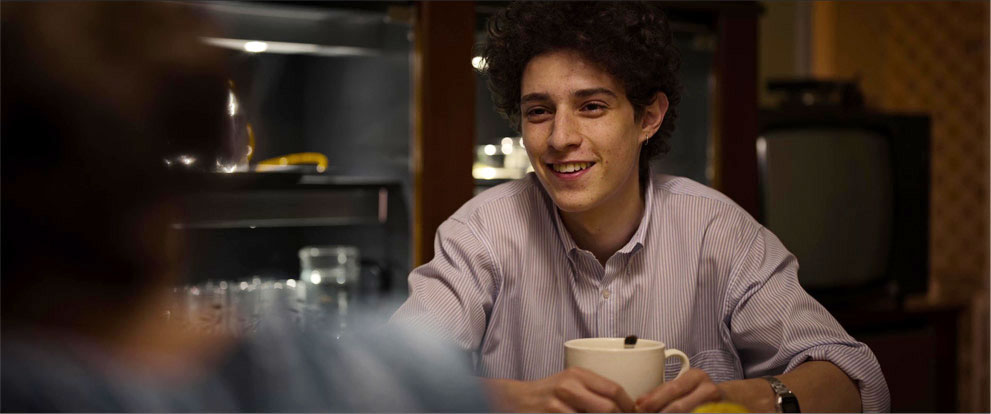
THE HAND OF GOD (É STATA LA MANO DI DIO)
While expecting the grandiose title to be more significant and biblical in origin, it actually refers to the 'hand of God' that so upset English football fans at the 1986 World Cup. Losing 2-1 to Argentina, the English were enraged by Diego Maradona's blatant fist that knocked the ball past the keeper soring goal number one. Today, Mr. Maradona would have been Video Assisted Refereed and promptly sent off. This would have been a shame considering the extraordinary winning goal he scored, dribbling past one after the other English players over 66 yards, a goal many concede is one of the very best ever. It's the 80s and a young boy Fabietto, obsessed by Mr. Maradona, lives at home in Naples and desperately wanting to leave to study philosophy. Written and directed by Paolo Sorrentino, the film is semi-autobiographical. In a series of family episodes, we are invited to observe Fabietto's troubled passage into manhood. His disturbed aunt Patritzia, a curvaceous, beautiful woman trapped in an abusive marriage, manages to stir Fabietto's lust by sunbathing comfortably naked. Almost exactly halfway is an extraordinary scene, perceived as mundane and normal which elicits a wildly different emotional response when you understand just exactly what you were watching. Tragedies occur and neighbours fall out, but life goes on in this intriguing and effective, emotional coming of age drama.
KLAUS
An English-speaking Spanish animated film (why?) directed by Sergio Pablos, Klaus tells the story of an alternate Santa myth set in a fictional 'Northern' European (one assumes) village. I can't tell you how lovely it is to see an animated film that looks like classic hand painted cell animation despite the inevitability of computer involvement. It uses modern techniques to go back to the classic second age of Disney animation even employing staff animators who worked on The Hunchback of Notre Dame and The Lion King. It looks absolutely glorious. It is the tale of a lazy son whose father wants to set him a task so he learns to accept responsibility. Jesper is sent north with an assignment of sending out six thousand letters in a year (both Jesper and his father are postmen). When he arrives, he realises the village of Smeerensburg is in a long standing civil war between two powerful families. Only by recruiting the mysterious toymaker Klaus, can Jesper hope to reach his goal and of course along the way, old wounds are healed and order and a new hope is restored.
THE MATRIX RESURRECTIONS
I was so tempted to jump with two feet into this one. Two of the most entertaining and perceptive film critics out on YouTube – for my money – are The Critical Drinker and Red Letter Media's Half in the Bag. The former tore Resurrections into strips, chewed them up and spat them out while Mike Stoklasa of RLM pointed out the same flaws and missteps but regardless "loved every minute of it." I'm with Mike on this one. I've only seen it the once but was truly swept away by the attempts of single sister Lana Wachowski to stay leaps ahead of her own audience by truly ticking every box of thoughts and opinions that her previous trilogy fans may have had. There is a touching quote on the film's Wikipedia page from Lana suffering from grief after two many losses in too short a time. She says "I couldn't have my Mom and Dad yet suddenly I had Neo and Trinity, arguably the two most important characters in my life." Here is a filmmaker who's really dived deep into a mythology she and her sister created 23 years ago (credited then as 'The Wachowski Brothers' pre-gender change). Her sibling, Lilly was committed on another project leaving Resurrections in Lana's capable hands. Thomas Anderson (Keanu Reeves) is a middle aged computer game designer who created the Matrix. In presumably 'real life' he sees Tiffany, a middle aged version of Trinity (Carrie-Anne Moss) from the game. He attends therapy sessions to work out what's real and what isn't. After a series of scenes, direct action quotations from the groundbreaking 1999 original using a younger cast (something Ghostbusters Afterlife also indulged in), we are launched right into the same story as Neo is plucked from his goo capsule and rescued again. This is the film the word 'meta' was coined for as you smile and nod at so many references to the original and even to the making of the film itself. Let's just say that Lana Wachowski breaks the fourth wall, finds a fifth wall to break, eyes up a sixth and the film's cleverness and ridiculousness are simultaneously overwhelming. Am gearing up for a re-watch. There's also an autobiographical thread through the film that while Neo was 'the one' in 1999, the male Thomas Anderson, 'the one' in Resurrections is in fact Trinity. From a boy to a girl. Doesn't that remind you of anyone?
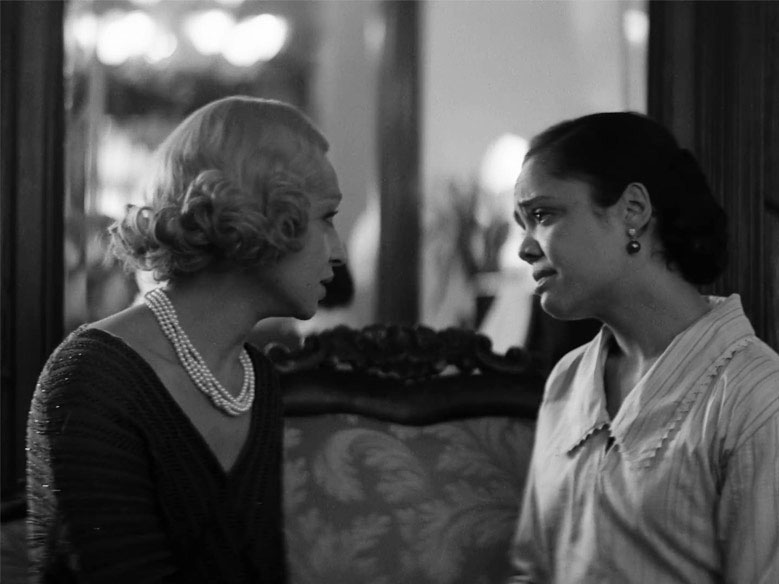
PASSING
An extraordinary premise sits at the heart of this effective social issue film. Shot in 1.37:1's Academy ratio and in black and white (undeniably apt), Passing is the story of two women in America in the 20s, (that's the 1920s just to be specific). Two school friends encounter each other in a hotel after many years and both share a secret. Tessa Thompson and Ruth Negga play Irene and Clare respectively. Irene, a light-skinned black woman, moves through New York City able to pass as white in upmarket areas off limits to people of colour. Clare has taken that one step further and married a white man, a racist monster of a white man, no less. Attending parties and soirées, the two girls combine their social circles. Socialite and novelist Hugh Wentworth, a role that Benedict Cumberbatch was earmarked for but unable to play due to tight budgets and not living in New York, is suspicious of Clare at first, The collision of secrets and lies leaves lives shattered and broken. Director Rebecca Hall has done an extraordinary job at highlighting this aspect of some women's lives based on the 1929 book of the same name by author Nella Larsen. Well worth a watch.
THE POWER OF THE DOG
Mr. Cumberbatch, you do get around, don't you? Ironically, he didn't get around during the shooting of The Power of the Dog as he was stuck in a luxurious lodge in New Zealand with his holidaying parents and his own family due to Covid restrictions. Director Jane Campion has nurtured a reputation for critically acclaimed films made at a leisurely career pace. She's 67 and has made only seven feature films but it's a great line up for this talented New Zealander. Here she helms a western set in what was Middle Earth doubling now for the wild west of American folklore. Phil Burbank (Cumberbatch) has obliterated his true self with a abusive veneer of machismo, a front he feels is expected of a successful rancher in the west. He's strongly connected to his brother George (Jesse Plemons) and has a fit when his brother falls for and marries Rose, a nervy and nervous Kirsten Dunst. While George kindly takes on Rose's son, the slight, fey, lisping and effeminate Peter, (Kodi Smit-McPhee), Phil psychologically bullies both sister-in-law and her son to a degree that seems overwrought and wildly compensating for something. Rose resorts to the bottle and not just one. A drip feed of visually metaphorical clues lets us in to why Phil is the way he is. He has a past that points heavily towards a homosexual love affair with a man, now dead, a man he continues to idolise, Bronco Henry. As Phil softens towards Peter, events take a dark turn. The performances are excellent and the drama sweeps you along. Two things worth noting, one a bit off, the other obtuse. There are a plethora of discernible phallic symbols all throughout the film and Phil's physical responses to some of them (caressing the horn on the front of a saddle as he's 'cleaning' it) are so garishly obvious, you might want to laugh. I think this subject and how it's handled even came up between director and editor Peter Sciberras. There are many emotions that are evoked in this intense character study but laughter would be inappropriate. Finally, if you are wise like my wife as we watched this together, you'll figure out what's going on narratively step by step. I missed a few pointers but all was cleared up in the sly and very revealing final shot.
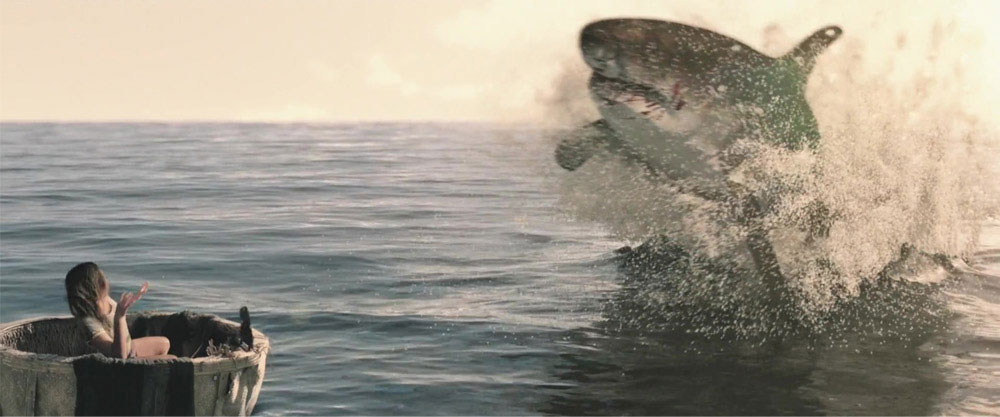
THE REQUIN
At the risk of creating a title that no one would associate with Jaws-like danger, The Requin has not got off to a promising start. From the Jaws-a-like poster, once again vastly oversizing the shark in relation to its would be victim, it is fairly clear what this film might be about but I had to look up 'requin'. I've had a lot of jobs working on oceanic documentaries so you'd think I would have come across a word that is another word for 'requiem shark' meaning 'sharks of the family Carcharhinidae'. Ah well. So the shark's on the poster and the title means shark. You'd think the film would be about, I don't know… say, a shark? Nope. A couple recovering after a traumatic miscarriage travel to a beach hut in Vietnam built over the ocean to try and bring themselves out of their grief. Out of the frying pan…They do touristy things and flashback to the miscarriage. A tropical storm rips their bungalow from its moorings and sends them out to sea. So far so not so good. Alicia Silverstone has proved herself on many occasions not least on screen and on the stage but her character here, after 25 mins, is in a state of complete panic and desperation for a lot of the remaining running time and no actress or actor can sustain that without it grating some percentage of the audience. I guess you could say that Marilyn Burns did an extraordinary job doing just that in The Texas Chain Saw Massacre but The Requin is not a classic horror film. There's a moment when Silverstone is thrown from a window space as the hut is blown near and collides with rocks. OK, husband grabs her and 'holds' her outside the window for almost 45 seconds. OK, he has a broken leg and is probably in agony but he is holding the love of his life and right now is when his upper body strength deserts him? He drops her to protect her from being squished against another rock formation but he should have pulled her up to 'safety' in 5 seconds. There are some mistimed cuts in this sequence but that 45 seconds would have been so much more thrilling if it had been 10. And I have to admit, I was shouting at the screen, "Get on the rocks!!!" To get a passing ship to see them, they start a fire. On a floating bamboo hut. I am not making this up. The effects are not particularly special which drains all the shark vs. people scenes of any real jeopardy. But having said all this, crack open a bottle and enjoy it as a ridiculous but guilty pleasure.
ROMAN HOLIDAY
A good friend of mine sent me a fascinating book about Italy and Rome after the Second World War and how the world in general benefitted from Italian culture. Shawn Levy's Dolce Vita Confidential has piqued my interest and invigorated my regard for Italian cinema. It's kickstarted something I should have done a long time ago… a dive into Italian cinema or at least, to check out the titles featured in the book. My first safe stop is a very well-known Hollywood film set in Rome that introduced the world to the elfin goddess that is Audrey Hepburn. It's essentially It Happened One Night, the sublime Clark Gable and Claudette Colbert classic of a reporter attaching himself to a real life princess/heiress and trying hard to focus on the money he'll make. Of course both reporters in both films fall in love. But then Gregory Peck knew Hepburn's star quality the moment he met her. He was a bigger star and this was her first starring role. He insisted she get joint billing as he didn't want to be the schmuck that didn't recognise his co-star's ethereal charisma straight off the bat. You have to admire him for that gesture. The film is a delight, filmed very obviously on location in one of Europe's most compelling and attractive cities (I've been once and was awed by it). The film features two characters whose goals are at first at cross purposes and then as the emotions start to assert themselves, gallantry and love replace deceit and greed. On the cover of the earlier mentioned book is the classic still of Hepburn and Peck on a Vesper. Ciao!
SPENCER
And to a true surprise more from the skewed point of view of my ridiculous prejudices and thoughtless assumptions. OK, having money and access may offset the sheer drudgery and pain of being a movie star but there are aspects of fame I wouldn't wish on Voldemort. Firstly, an over interest in a famous person skews honest emotional interaction. Stars are like fires and we all want to feel the heat. The esteemed editor of this site has never shown much interest in being a fawning 'fan' despite his authentic appreciation of good films and filmmakers. That said, I remember an email from him ten years ago, a reply to one of mine addressed to 'Cath DeNeuve's bezzie mate' and he replied from that year's Rendez-Vous with French Film Festival saying "Uncanny. Catherine Deneuve walked right past us." Stardom is a powerful thing. The other aspect of being a star which I simply could not handle is all the kowtowing. Surrounded by 'Yes' people is not the best way to live a life. But we are the architects of our own responses to famous people. Some stars close down and remain detached from their adoring fans and I suppose this is one way to handle the stress. Some are open and appreciative and treat fans respectfully and with grace. Hitting just the right balance is Stephen Fry who is honest about his inability to respond to fan requests.
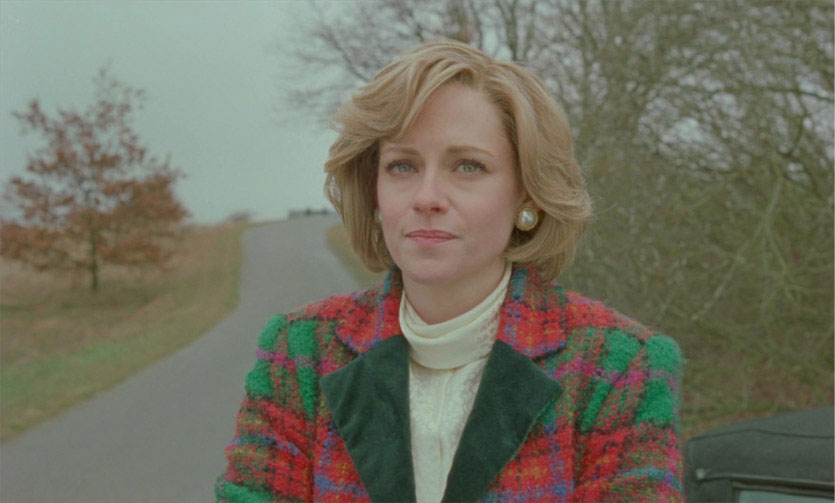
So, two actors hit a vein of box office gold and over the course of the five entries, became huge global stars. Both actors hit a tsunami of fame and at such a young age, that can damage a person. Twilight's Bella and Edward were entwined in so many fans' hearts that when both became romantically attached for real, the internet melted down (No, it didn't. Ed.) Robert Pattison, according to reports, is an actor that takes his profession seriously and probably has enough money to carefully manage his own career. His work has been eclectic and challenging and you have to give him credit for that. Kirsten Stewart's career path post Twilight has followed a similar path, mostly independent films with a smattering of big budget Hollywood behemoths. This is laudable but up until I saw Spencer, I felt I'd not seen her immerse herself so successfully in bringing a character's truthfulness out into the fierce glare of the rest of the world. I've not seen all of her films so I was perhaps just accepting the rather lovestruck Bella as the 'Kirsten Stewart' acting template (bite lip, release lip, look mournful and look a little bit less mournful). This was wrong and needlessly, negatively judgemental. She had some fun in Charlie's Angels and flexed some ripped heroine muscles in Underwater but nothing I'd seen her in prepared me for just how superb she is as Princess Diana.
Spencer is about a troubled Diana spending a Christmas weekend with the Royal family and not being of particularly good cheer throughout. Stewart's rendition is not a copy, an imitation or a caricature. She channels Diana, and almost steals her soul for her performance. Stewart nails the flighty cadence of her pin sharp, cut glass English accent, superbly well. In a Sight and Sound interview she admits to being exhausted at the end of each day's shooting. If you study her physical work in the film, it's no wonder. She's all nervous energy, with contempt for 'the Firm' (the Royal Family's nickname) piled high on delicate shoulders. She's in almost every scene and you get the impression she knows there's a camera just as the real Diana was painfully aware of the interest taken in her. Sometimes she runs from us or indeed the camera as if the paparazzi wolves were snapping at her heels. Timothy Spall as Major Gregory, tasked to keep everyone obeying the rules, and free from press attention, has a touching scene with Diana on the steps of the grounds in Sandringham. He is presented at first as an odious equerry crushing Diana's rebellious spirit but the scene is a moving one. It's a rare moment in the film when the warring factions have an ounce of respect for what the other is going through.
Aspects of the film's Jonny Greenwood soundtrack are almost free-form jazz flitting with weighty strings, a disconcerting melange of sound but oddly and strangely comfortable on Diana's shoulders.
Oh for God's sake. That was supposed to be a paragraph review. Stop now! |